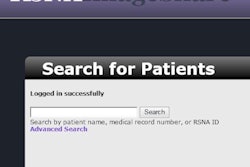The RSNA Image Share Project is moving forward with expansion plans after receiving a two-year, $5.3 million contract from the National Institute of Biomedical Imaging and Bioengineering (NIBIB). The contract also provides an option for a two-year extension for an additional $5.5 million.
The institute has supported the project since a pilot program to build a secure, patient-centric medical imaging sharing network began in 2009.
The network is based on common open-standards architecture enabling patients to control access to their information through personal health records (PHR), according to the RSNA. Images and reports from participating sites are sent to an Internet-based secure image clearinghouse for storage and distribution.
More than 2000 patients have used the network since implementation in 2011, according to the RSNA. PHR accounts allow them to gain access their personal imaging file and to share images with selected providers and their electronic health records.
Participating sites are Mayo Clinic in Rochester, MN; Mount Sinai Medical Center in New York City; University of California, San Francisco; University of Chicago Medical Center; and University of Maryland Medical Center in Baltimore.
The new NIBIB grant will fund expansion. The project plans to add 40 more sites in the next four years. A computer system, Edge Server, was developed during the pilot project to connect local radiology systems to the network.
The entire Philadelphia metropolitan area is one focus of expansion, as is the Central Alabama Health Information Exchange. In addition, vendors have expressed interest in adding their client sites into the network, which could rapidly increase the number of participating sites and patients, according to RSNA.
The new contract also provides for expanding the cases addressed by the Image Share network. In addition to the patient-controlled model, the network will be made capable of supporting provider-to-provider exchange of information with patient consent, so that participating sites can use it for consult or emergency cases.
The network's capabilities also will be expanded to support exchange of images for multisite imaging research. The contract funds will be used to improve the efficiency of image exchange by using streaming technologies and promoting refinements to standards for medical imaging data.
Finally, the new contract provides funding for pilot projects that make use of the data gathered by Edge Servers at the participating sites for decision support, effectiveness research, and other data mining applications.



















